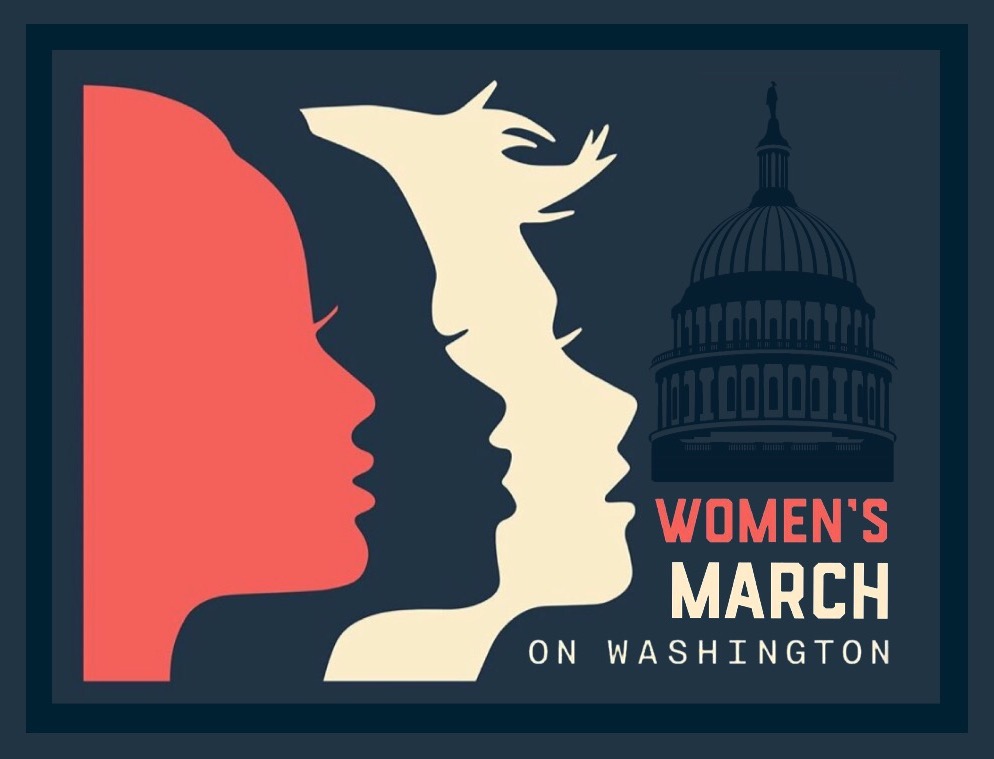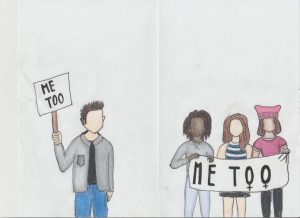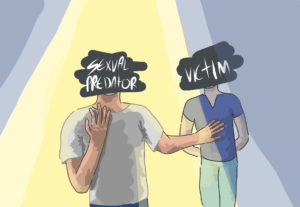Athens women “March on Washington”

The Women’s March on Washington is a movement started in response to the results after election day on Nov. 8. Now, it has grown into a national cause that will be drawing almost 200,000 people to join near the U.S. Capitol on Jan. 21, the day after the presidential inauguration. “In the spirit of democracy and honoring the champions of human rights, dignity, and justice who have come before us, we join in diversity to show our presence in numbers too great to ignore.” The Women’s March on Washington national committee wrote in in their official mission statement. “We stand together, recognizing that defending the most marginalized among us is defending all of us.” Graphic by Katie Grace Upchurch.
Across the country, activists have made plans to gather near the U.S. capitol in Washington, D.C. on Jan. 21, the day after the presidential inauguration. Members of the Athens and Clarke Central High School communities are joining the act of solidarity in support of women everywhere.
A message from the Women’s March on Washington founders: “On January 21, 2017 we will unite in Washington, DC for the Women’s March on Washington. We stand together in solidarity with our partners and children for the protection of our rights, our safety, our health, and our families — recognizing that our vibrant and diverse communities are the strength of our country.”
Following the events of election night on Nov. 8, activists immediately began organizing protests after the projection of Donald Trump, who has now been officially selected by the electoral college. The Women’s March on Washington (WMW) is a grassroots movement that has drawn almost 200,000 marchers from all across the country to join.
Participants will be arriving in Washington, D.C. by cars, buses, trains and planes on Jan. 21, and gathering near the U.S. Capitol to march and rally in solidarity to, “send a bold message to our new administration on their first day in office, and to the world that women’s rights are human rights. We stand together, recognizing that defending the most marginalized among us is defending all of us,” according to the WMW founders’ official mission statement.
A post from the Women’s March on Washington Instagram, which features an illustration that is is a part of “#WMWArt” and is captioned with, “Yeah, we got this.”
Joining the WMW are Clarke Central High School students and members of the Athens community. Rachel Watkins, mother of CCHS freshman Anna Frances Julian, believes this is important for them to be a part of the WMW because it reinforces values of equality that they believe have been dismissed in the past year.
“I just thought that it would be a cool opportunity because I don’t know what to expect,” Watkins said. “But, I’m going with friends, and it’s going to be okay, and it’s going to be a once-in-a-lifetime thing, and I thought it would be a super cool (way) to demonstrate to my daughter that (women’s) rights matter.”
CCHS freshman Beatrice Acheson, and her mother and sister will also be attending the march. Acheson says that being a part of the WMW means a lot to her in light of the events of the past year.
This map compiles locations of Women’s March on Washington chapters, sister marches and rallies and locations which buses are traveling from to join. Select the icon in the top left corner for more information and options.
“(Being in the WMW) was just an idea that turned into something bigger,” Acheson said. “(We realized) that we had the opportunity to be part of such a big event in history, something that would hopefully be really powerful and show that this is who we are, and we’re not scared, we’re just angry.”
Over the course of 2016, more and more came out about the dehumanizing and insulting things Donald Trump says about women. He has called them names such as “dogs”, “pigs” and slobs”, and in a video leaked by the Washington Post on Oct. 8, 2016, he was recorded saying vulgar things about the way that he treats women.
“As young women, we had a lot of hope before the election, it was going to be this really big thing and we were going to have a woman as president,” Acheson said. “It slowly went down(hill) from there.”
Freshman Anna Frances Julian agrees that this election has sent messages of hatred and believes that it has created an environment that is especially terrifying for women and minorities.
“Even if Trump doesn’t do anything, because he is an underqualified president, (his election) marks a change in how our society works. It validates the beliefs and the motives of people who are bigoted, who have huge positions of power and who are horrible to minorities,” Julian said. “I think that it not only validates them, but it encourages them.”
Clarke Middle School teacher Meghan McNeeley will also be attending the WMW, and she says the messages that Trump’s success has sent are very dangerous and harmful.
“I think the people who supported Trump are feeling like they might now have a get-out-of-jail-free card,” McNeeley said. “The number of hate crimes, racist attacks or messages (are) spiraling out of control. It seems as though there’s another attack or incident every time I turn on NPR or read the news. It’s really disturbing.”
McNeeley says that she think these things will have effects on her students, but believes that it is too early to know what that will mean in the long run.
“Right now, I think it’s too soon to tell (how students will be impacted, but) I know that they have already felt the ripple effect of the election,” McNeeley said. “The day after students were visibly upset – tears, words, actions and outbursts – but I’m not sure what the lasting impact will be, and I’m not comfortable speculating.”
McNeeley says that she has never been very political and has never publically protested anything, but the WMW is a way for her to prevent herself from becoming a bystander.
“I cannot be one of those people (who remain indifferent). I have to do what I can, when I can, where I can, however I can,” McNeeley said. “I hope (the WMW) makes people realize that Trump’s presidency is not going to be taken lightly,” McNeeley said.
Since the election, more than 4,500 women have signed up to run for office. Will you be next? https://t.co/5BpFT5MCY1
— Women’s March (@womensmarch) December 13, 2016
Since the election, over 4,500 women have taken action and registered to run for political office, and Acheson says that even though this election didn’t turn out the way that she believes it should have, there were still some good things that came from it.
“I think, despite the results, it was really empowering that (senator Hillary Clinton) got really far, and just knowing (there is) someone who represents you, since you’ve never had that before (is comforting),” Acheson said. “It makes it a lot easier to be in this country.”
Acheson believes that through the march, there is a platform for people to stand up and speak their minds. With this platform, they can combat the negativity and hate that was perpetuated by Donald Trump and utilize the empowerment that came from Hillary Clinton.
A post from the Women’s March on Washington Instagram, which features an illustration from user @cdietzbrown. The illustration is is a part of “#WMWArt” and is captioned with, “You are loved. You are valued.”
“We’re here and we matter, and people who are not white matter, and it’s not necessarily just women, it’s everyone who isn’t represented by the person now running our country,” Acheson said, “(The WMW is) showing that his opinion and what he does will not define us.”
More from Katie Grace Upchurch
Enraged McCage

Despite the cultural progress made by the #MeToo movement, the state of Georgia is still stuck in the past when it comes to how sexual assault is handled legally. Illustration by Luna Reichert
Our country, and most of the world, has a problem with discussing uncomfortable topics.
It’s much easier to set up and knock down strawmen, and offer temporary solutions instead of actually looking at the problem as a whole. Many movements have emerged in light of this to generate and have those uncomfortable conversations, most notably the #MeToo movement.
The #MeToo hashtag was a recent movement on social media that served as a rallying cry for victims of sexual assault and rape. It exposed many high-profile celebrities, such as Harvey Weinstein, Kevin Spacey and Bill Cosby, as having a long history full of these horrendous crimes.
The majority of the victims stepping out with their stories were female, but some males, such as Terry Crews — known for his bizarre Old Spice commercials and roles in the “Fast and Furious” series worked to raise awareness for men who were victims of sexual assault, as well. Crews went so far as to speak to the Senate regarding the issue.
In his speech, Crews condemned our culture of toxic masculinity that prevents men from stepping forward when they have been raped or sexually assaulted due to a fear of being viewed as a coward, or as weak. In a 2014, 38 percent of victims reported to UCLA’s Health and Human Rights Law Project were male. In 2012, another study by the Center of Disease Control found that one in 17 men were victims of some form of rape.
Despite these facts, Georgia does not allow men to press charges for rape.
Rape in Georgia is described as “as a man having ‘carnal knowledge’ of ‘a female forcibly and against her will.” Carnal knowledge is described as “any penetration of the female sex organ by the male sex organ” within the act of rape.
This means that men can not press charges or seek legal action if they are victims of rape and that they can only press charges for sexual assault. Sexual assault carries a maximum of 25 years in jail for those over the age of 16, while rape can be punishable by life in prison or the death penalty.
To deny that male rape is real or to deny men the right to press charges in the event of rape is unacceptable. In 2017, Atlanta changed its definition of rape to the FBI’s gender-neutral description which was updated in 2014. The new definition describes rape as “Penetration, no matter how slight, of the vagina or anus with any body part or object, or oral penetration by a sex organ of another person, without the consent of the victim.”
Following Atlanta’s change, the city saw a double in the amount of rapes reported in 2016. Despite this information, the rest of Georgia still has the outdated definition of rape.
Under state Senate bill 145, the statewide definition of rape would be expanded to include both genders. However the bill failed to pass in 2017 and has made no motion towards being passed in 2018.
The fact that this is happening in light of all the progress made through the #MeToo movement is appalling and the people of Georgia should rally to fix it.
The state of Georgia continues to operates in complete ignorance of clear statistics, and our state’s legislators refuse to move forward.
To end our culture’s history of ignoring sexual assault, we need to attack the issue from the top and acknowledge rape no matter gender and always carry the same legal consequences.
The lost voices of sexual misconduct

Since allegations against Hollywood producer Harvey Weinstein, the #MeToo movement has caused an increase in allegations of sexual assault. Some have expressed regret that the careers of these sexual predators may be over, but this ignores the harm these predators may have done to the careers of their victims. Illustration by Audrey Kennedy
Numerous allegations have surfaced recently, accusing prominent figures in media, politics and athletics, of sexual misconduct. The general reaction of the public has been one of horror and shock.
But sometimes, the horror is not just about the damage these predators caused to victims, but also the lost talent of the accused.
Comedian Louis C.K. was considered a comedy genius by many, and the recent allegations of sexual misconduct caused some people to express remorse that such talent will now go to waste.
It is a blow to learn that someone you admire is a sexual predator, but whenever we express disappointment and regret that we are losing a force of talent, we are ignoring the women that have been silenced and pushed out of their careers because of this same toxicity.
Many women face incredible shame, fear and pressure in the workplace after having been harassed or assaulted, and the number of women who have faced this is unquantifiable — because they have been pushed out of their career before reaching their full potential.
Glenn Thrush, a reporter for the New York Times, was recently accused by several women of unwanted sexual advances. At the time, all of the women were young journalists and Thrush was seen as someone who could make or break the career of someone trying to make it in journalism. So most of the women tried to pretend nothing happened.
But one of the alleged victims, Laura McGann, felt personal and job repercussions after unwanted advances from Thrush.
“Gradually, things in the office started to change for me. I had a nagging sense that I just wasn’t as respected as I used to be,” McGann wrote, reflecting on the aftermath of an uncomfortable interaction with Thrush. “I started to think maybe I shouldn’t be in journalism if I couldn’t hang in a tough newsroom. I found myself on edge, nervous and anxious all the time. I started to believe I had brought this all on myself.”
Because of Thrush’s actions, McGann felt that her career could not advance as she wanted it to, and it is impossible to know the incredible numbers of women, who could have been leaders in their fields, whose careers were cut short because of this fear.
As more harassment and assault allegations come forward, it’s important to remember that we are not just losing the career of the predator — we may have already lost the careers of the victims.
More from Elena Gilbertson Hall